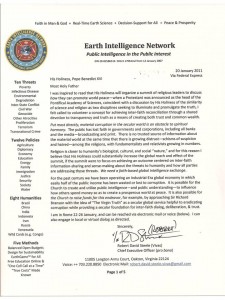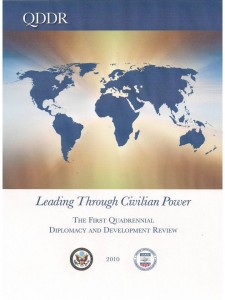
Letter to His Holiness Pope Benedict XVI
Resume Robert David STEELE Vivas M4IS2
See Also:
28 Jan Seven Answers–Robert Steele in Rome
27 Jan Assisi-Rome 2nd Meeting
27 Jan Reference: Correspondence on Assisi Intelligence

Letter to His Holiness Pope Benedict XVI
Resume Robert David STEELE Vivas M4IS2
See Also:
28 Jan Seven Answers–Robert Steele in Rome
27 Jan Assisi-Rome 2nd Meeting
27 Jan Reference: Correspondence on Assisi Intelligence

by jonl on January 10, 2011
This is something I posted in the “state of the world” conversation with Bruce Sterling on the WELL…
I give talks on the history and future of media, and on the history, evolution, and history of the Internet. I gave the talk this week to a small group gathered for lunch in a coworking space here in Austin, and after hearing the talk a technologist I know, Gray Abbott, suggested that I say more about the coming balkanization of the network as the most likely scenario. The Internet is a network of networks that depends on cooperative peering agreements – I carry your traffic and you carry mine. The high speed Internet is increasingly dependent on the networks of big providers, the telcos or cable companies like AT&T, Sprint, Verizon, Time Warner, and Comcast. They all see the substantial value supported by their networks and want to extract more of it for themselves. They talk about the high cost of bandwidth as a rationale for charging more for services – or metering services – but I think the real issue is value. When you see Google and Facebook and Netflix making bundles of money using your pipes, you want a cut. And if you’ve also tried to get into the business of providing content, it’s bothersome to see your network carrying other competing content services, including guerilla media distribution via BitTorrent.
Continue reading “Reference: Network Neutrality…Why Not…+ RECAP”

“We've Heard All This About American Decline Before.”
This time it's different. It's certainly true that America has been through cycles of declinism in the past. Campaigning for the presidency in 1960, John F. Kennedy complained, “American strength relative to that of the Soviet Union has been slipping, and communism has been advancing steadily in every area of the world.” Ezra Vogel's Japan as Number One was published in 1979, heralding a decade of steadily rising paranoia about Japanese manufacturing techniques and trade policies.
In the end, of course, the Soviet and Japanese threats to American supremacy proved chimerical. So Americans can be forgiven if they greet talk of a new challenge from China as just another case of the boy who cried wolf. But a frequently overlooked fact about that fable is that the boy was eventually proved right. The wolf did arrive — and China is the wolf.
Gideon Rachman is chief foreign-affairs commentator for the Financial Times and author of Zero-Sum Future: American Power in an Age of Anxiety.
 Phi Beta Iota: The problem with the “status quo” actors and thinkers–however good their intentions–is that they simply do not know what they do not know. The world can indeed be zero-sum. It can also be non-zero sum, a case made by Robert Wright and summarized in Review: Nonzero–The Logic of Human Destiny. We know how to do this and want to do this. Those in power do not know how to do this and do not want to do this. Therein lies the challenge–all it takes is ONE leader–Cynthia McKinney comes to mind–willing to stand up, demand Electoral Reform (1 Page, 9 Points), and the rest will be history–a very good history of the Second American Republic, how it came to its senses, and created a prosperous world at peace through intelligence as design. Now THAT is Advanced Cyber/IO!
Phi Beta Iota: The problem with the “status quo” actors and thinkers–however good their intentions–is that they simply do not know what they do not know. The world can indeed be zero-sum. It can also be non-zero sum, a case made by Robert Wright and summarized in Review: Nonzero–The Logic of Human Destiny. We know how to do this and want to do this. Those in power do not know how to do this and do not want to do this. Therein lies the challenge–all it takes is ONE leader–Cynthia McKinney comes to mind–willing to stand up, demand Electoral Reform (1 Page, 9 Points), and the rest will be history–a very good history of the Second American Republic, how it came to its senses, and created a prosperous world at peace through intelligence as design. Now THAT is Advanced Cyber/IO!
Graphic: Intelligence Maturity Scale
Review: Evolutionary Activism by Tom Atlee
Review: Ideas and Integrities–A Spontaneous Autobiographical Disclosure
Preconditions of Revolution in the USA Today
Reference: Electoral Reform (Huffington Post Version)
Reference: Electoral Reform–1 Page 9 Points 2.2 (Document Only)
 Working for change: Samasource redefines international aid
Working for change: Samasource redefines international aid On Need to Know, we do a lot of reporting about the world’s problems. But we’re premiering a new series about people coming up with creative solutions — it’s called “Agents of Change.”
Click on title to read short intro and option to view video….
9 minutes — summary
Social entrepreneur challenging conventional wisdom
Samasource–microwork (small digital tasks that can be done on an inexpensive computers).
Building 21st Century assembly line that can break down massive tasks (e.g. updating addresses for Google maps, or translating emergency messages from Creole to English). Won contracts with Google, LinkedIn, Microsoft.
15% premium for socially-conscious companies, AND competitive on cost, quality, and turnaround time.
Small scale digital tasks did not exist before.
Transforming lives, especially women, young men, and refugees. $5 a day is very much better than local norms, and buys an active English-speaking brain with hands able to do quality work.
IMPORTANT: Developing world is out-pacing USA and West generally in extending Internet infrastructure to the poor–centers created, humans come in, also doing viewing (Gorgon Stare, take note!), creating logs of store videos on shopper buying habits, anything that can be noticed and logged by a human–$5 a day.
Phi Beta Iota: We could not, in a million years, have found a better “off-set” to the USAF Gorgon Stare program. This micro-tasking, combining human brains and hands with Internet access, is one of the most profoundly intelligent and socio-economically useful ideas we have seen in our lifetimes (there are 800 of us here). BRAVO.

PART I: The Only Way to Fix the Deficit–Multiply Jobs (William Drayton)
PART II: Nice Ideas But So Is Icing Cover Feces (Robert Steele)
PART III: Create Jobs? As an End In Themselves? To Do What? Why? (Alexander Carpenter)
PART IV: Related Recommended Reading (Robert Steele)
The core take-away (from PART III)
Beyond its inherent merit and explicit substance, William Drayton: The Only Way to Fix the Deficit: Multiply Jobs is a great example of unconscious status-seeking righteousness – well-meaning ineptitude and irrelevance, trapped in the old paradigm of debt-money, growth, and social conditioning. This kind of thinking is exemplary of people who are focused on the superficial “economic crisis,” not going deeper to see that we have a political (and even a social) crisis with, of course, an economic manifestation. This represents the success of the pseudo-science of “economics,” originally created with the intention to get most people to believe that objective “natural” forces are running their lives, not other people, classes, and institutions (Thurmond Arnold, 1937). Good problem-solvers always begin with as much accurate information about the overall problem as possible. It's incompetent – or unconscious self-deception – to assume human nature isn't the core and essence of the problem, and Bill Drayton isn't necessarily incompetent…
Perspective (from PART III Reference):
“By providing the funding and the policy framework to many concerned and dedicated people working within the non-profit sector, the ruling class is able to co-opt leadership from grassroots communities, … and is able to make the funding, accounting, and evaluation components of the work so time consuming and onerous that social justice work is virtually impossible under these conditions” (Paul Kivel, You Call this Democracy, Who Benefits, Who Pays and Who Really Decides, 2004, p. 122 )
Phi Beta Iota: In Advanced Information Operations (IO) terms, we cannot fix the military until we fix government, we cannot fix government until we fix Wall Street and Main Street, we cannot fix the economy until we fix the society, and all of that requires a firm focus on human nature and the relations among humans. We live is a “whole system” and are mis-managing it by being ignorant and delusional about root causes and actual relationships. Until we get the truth on the table, we cannot deal with it. Good news: all it takes is ONE node able to blend intelligence & integrity, that “spike” will proliferate. The bottom line is that DEMAND creates jobs, and EDUCATION creates the demand for the RIGHT jobs. Taking one example, the US Army, it could apply Advanced Information Operations to create a 180 degree maturation of the mind-set of its personnel, and use that to “eat the old” and create the new. The US Army is going to suffer a nose dive in financial resources (as will the other services); the US Army is the ONLY service that must might be capable of “beating the dive” by re-inventing itself from inside out–starting with Advanced IO being about minds, not technology. Similarly, a single multinational could “get a grip” and re-invent itself overnight–the example will proliferate.
Continue reading “Journal: Get America Working–A Conversation”

Phi Beta Iota: The US Government continues to be chaotic in part because its civilian leaders simply do not know what they do not know. They have the best of intentions, but have been promoted into a new world far removed from the world imprinted on them in their formative years. There are four ways to address global engagement needs:
1. With government employees performing inherently governmental functions. PROBLEM: The US Government has become hollow, with most of the experienced personnel scheduled for retirement in 2012 (if they don’t retire we lose what is left of the middle), and the bulk of the population, e.g. at CIA, having less than six years experience and being phenomenally ignorant of the real world. An inter-agency cadre for D&D does not exist.
2. With contractors hired to government specifications on a cost plus basis. This is what killed the Pentagon–decades of engineering responsive to military specifications on a cost plus basis, with no accountability anywhere. As we have seen in Iraq and elsewhere, individual instances aside, contractors are generally too expensive, very under-qualified, and often a major political risk hazard. They also loot our qualified manpower–in both intelligence and special forces, we have lost too many good people to bad jobs with too much money.
3. Multinational government task forces in which we plan, program, and budget for using the US military as a “core force” to provide intelligence, operations (mobility, logistics), and communications, and we default to unclassified information-sharing and sense-making. This allows culturally and linguistically qualified individuals to work at the highest levels of performance for the lowest per capita cost.
4. Multinational hybrid task forces in which we plan, program, and budget for using the US military as the “core force” to provide intelligence, operations (mobility, logistics), and communications, and we default to unclassified information-sharing and sense-making. This increases by a factor of SEVEN the number of culturally and linguistically qualified individuals to work at the highest performance levels for the lowest per capita cost with the greatest possible flexibility in covering all needs–the “eight tribes” (academia, civil society, commercial, government–all levels, law enforcement, media, military, non-governmental) become a “whole” force, using shared information and shared mostly unclassified decision support (intelligence) to achieve both a common view of the battlefield, and to most efficiently connect micro-needs in the AOR with micro-gifts from an infinite range of givers.
The Quadrennial Diplomacy and Development Review is at least 20 years too late. It means well. It is both delusional and incomplete. Delusional because no one part of government can become effective until the Office of Management and Budget (OmB) learns to manage again, and incomplete because State simple does not “get” bona fide multinational operations or recognize the “eight tribes.” There is a small seed crystal here, one that could flourish if the Department of Defense (DoD)–or any significant element of DoD such as the US Army–were to “flip the tortilla” and recognize that the greatest contribution DoD can make in the next 20 years is to get a grip on reality, get a grip on open spectrum, open source intelligence, and open source software, and serve as the “center” for Whole of Government planning, programming, and budgeting, toward the end of creating a prosperous world at peace via low-cost low-risk multinational hybrid task forces that use information and intelligence as a substitute for wealth, violence, time, and space.
NOTE: On some systems links above appear to be underlining, they are actually links.
See Also [Broken Link Fixed]:
Continue reading “Reference: Quadrennial Diplomacy & Development Review”
Be the Change: Save a Life
ABC News kicks off year-long global health care series Friday, Dec. 17 at 10pm eastern/9pm central.
“20/20 ABC starts a weekly show about the Design Revolution.”
Tonight: Stanford's Extreme Affordability Program showcased: http://abcn.ws/f16Dq9
Thanks to those posting to the Out of Poverty Twitter feed
Also see: